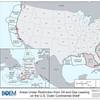Odebrecht Tries Again to Shed Colombia River Stake
Brazilian construction conglomerate Odebrecht is looking to dispose of its entire stake in Colombia's Magdalena River navigability project, as the company battles corruption allegations across Latin America, an official told Reuters.
Odebrecht had last year planned to give up most of its 87 percent stake in the Navelena consortium, tasked with the 2.5 trillion peso ($854 million) effort to increase cargo capacity on the river, sending the government on a fruitless months-long search for a replacement.
But the company later decided to keep a majority of its share after Japan's Sumitomo Mitsui bank said it would finance $250 million of the project.
That has now changed, according to an official at Cormagdalena, the government agency supervising the project, who said Odebrecht was seeking to shed all its interest in the project.
The official was not authorized to speak publicly on the matter. Odebrecht has not made public any financial terms of its proposed disposal of its Navelena stake.
Construction had been set to start this month, but Sumitomo has now asked for an additional three weeks to reconsider its financing offer after U.S. prosecutors alleged Odebrecht paid hundreds of millions of dollars in bribes in 12 countries, the official told Reuters.
Odebrecht's spokesman in Colombia said the company had no comment at this time on the Magdalena project or the corruption allegations. Sumitomo's office in New York had no immediate comment.
Colombia last week arrested a former senator and an ex-vice minister of transport for allegedly handling more than $11 million in bribes connected to a highway project.
The Ruta del Sol roadway contract with Odebrecht may be declared null, President Juan Manuel Santos told journalists at the World Economic Forum in Davos on Wednesday, so the country can look for other options.
The Magdalena dredging project, valued at 2.5 trillion Colombian pesos, is set to increase cargo transport on a 256 km (159 mile) section of the river to some 10 million tonnes by 2029, in an effort to reduce freight costs and aid exports by commodities producers and agricultural companies.
The Navelena consortium, which also includes Colombia's Valorcon, aims to profit from its investment in the project through toll charges for seven years after its upgrade of the waterway is complete.
By Julia Symmes Cobb












